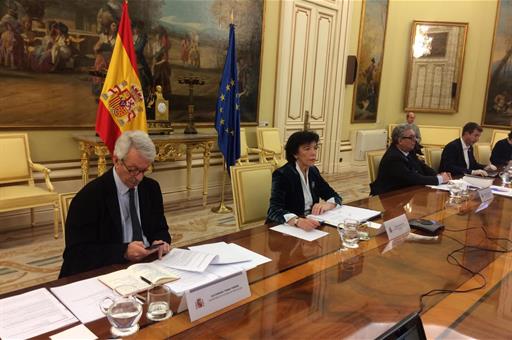Coronavirus COVID-19
Ministries of Education and Vocational Training, and of Universities, agree to change calendar and university entrance exams (EBAU)
News - 2020.3.25
This was agreed by the Ministry of Education and Vocational Training and the Ministry of Universities, together with the regional education departments at the Education Sector Conference held by video-conference and chaired by the Minister for Education and VT, Isabel Celaá, which included the participation of the State Secretary for Education, Alejandro Tiana; the Secretary-General for Vocational Training, Clara Sanz; the Junior Secretary for Education and Vocational Training, Fernando Gurrea, together with the regional education councillors.
"The Ministry of Education and Vocational Training is working hard during this crisis with the sole aim of ensuring that not a single pupil loses an academic year as a result of this situation caused by COVID-19", stressed Isabel Celaá.
Both the Ministry of Education and Vocational Training and the Ministry of Universities are aware of the difficulties being faced by teachers of the second year of advanced secondary education, and particularly for the students of that academic year due to the suspension of in situ classes forced by the infectious coronavirus disease COVID-19.
Accordingly, and to ensure that university entrance takes place on a level playing field, it was also agreed to alter the model and the content of the tests with the aim of not prejudicing students because they have not taken classes in one or several blocks of content of one or more of their subjects.
Although the dates proposed for taking the university entrance exams will depend on the spread of the pandemic, it was established that the marks will be published by 17 July from the ordinary sitting and by 18 September for the extraordinary sitting. Final allocation of university places cannot be made before 25 September.
Cancellation of diagnostic evaluation tests
The Ministry of Education and Vocational Training also proposed to the regional education departments the cancellation of the diagnostic evaluation tests established in the Constitutional Law on Improving the Quality of Education, currently in force, for third and sixth year primary school pupils and fourth year pupils of compulsory secondary education.
In terms of pupils taking this year overseas, the Ministry of Education and Vocational Training will establish specific systems to standardise their studies, given that most of them are continuing classes online.
The Education Sector Conference also approved the measures agreed on Wednesday at the Vocational Training Committee, primarily to make work experience at the work centre required to pass the year more flexible, and extend the period established in the academic year. This extraordinary measure should be coordinated with the dates to hold the university entrance exams which will allow all students who so wish to sit these exams.
Limitation on hours of work experience
The duration of work centre training (Spanish acronym: FCT) is limited on an exceptional basis to the minimum number of hours contained in basic regulations, that is, 220 hours. The FCT module will also be integrated on an exceptional basis with a project module so that the goals associated with the work environment can be addressed. This measure will affect all three levels of vocational training - basic, medium and advanced.
As regards the entrance exams for medium and advanced vocational training courses for those without the academic requirements to get on these courses, it was agreed to postpone them for as long as necessary, even up to the first half of July.
In addition to these measures, the Ministry of Education and Vocational Training has made all its digital resources available from its distance learning vocational training courses to the regional education departments, which cover 104 training cycles, to thus facilitate the continuity of these studies.
As regards other courses, the Ministry of Education and Vocational Training has prepared the web page 'Let's learn at home' to channel all the distance and online teaching materials that have been made available to the regional education departments and to families and pupils.
Non official translation





